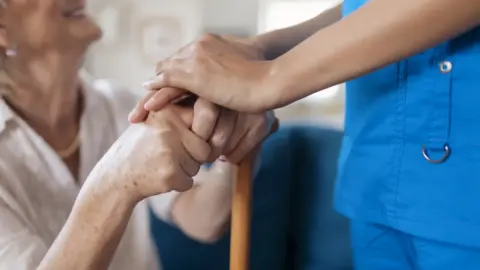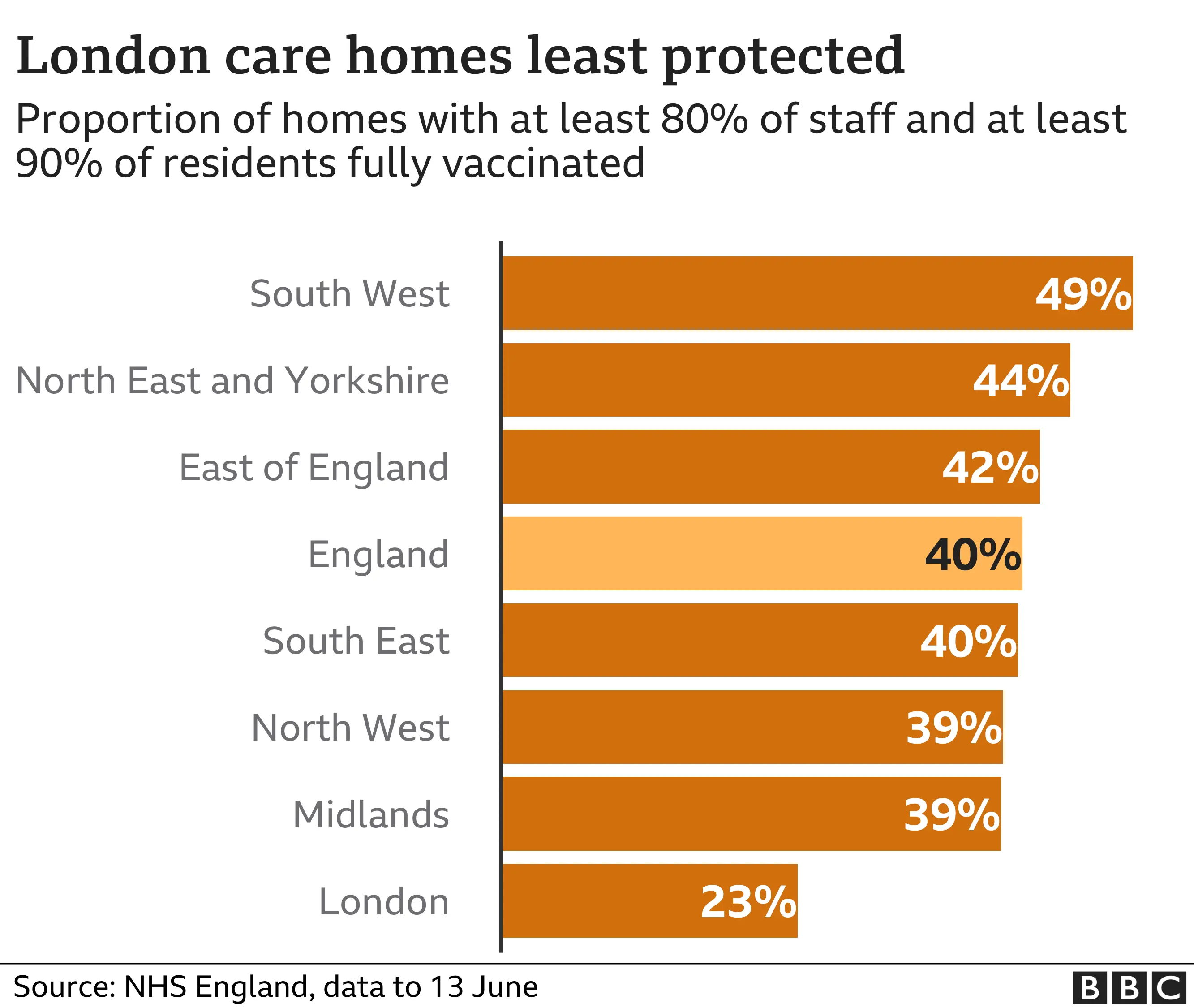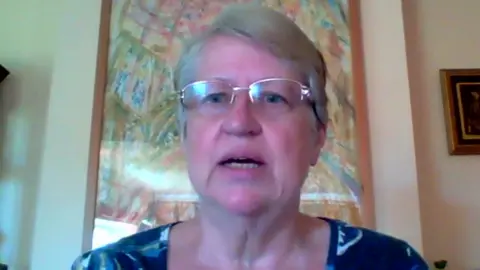Covid vaccine to be compulsory for England care home staff
 Getty Images
Getty ImagesCovid vaccinations are to become compulsory for staff at care homes in England, Health Secretary Matt Hancock has said.
Mr Hancock said it was a "sensible and reasonable step" and he would consult on extending it to the NHS.
There are no plans to extend mandatory vaccinations beyond health and care workers, he said.
Workers will have 16 weeks to get both jabs from the time regulations are approved by Parliament.
If they do not, they face being redeployed away from front-line care or potentially losing their job.
Mr Hancock told the House of Commons that the "vast majority of staff in care homes" were vaccinated, but not all of them.
"We know that the vaccine not only protects you but protects those around you," he said, adding that compulsory vaccinations in care homes and hospitals would save lives.
Care organisations have warned that compulsory vaccinations could cause significant difficulties in a sector that already struggles to recruit enough people.
The government, however, is believed to have considerable concerns about low take-up of the vaccine in some areas, including London.
A Whitehall source told the BBC that guidance to doctors that they should take the Hepatitis B vaccine suggested there is a precedent for mandatory vaccination.
The requirement will also apply to volunteers at care homes and those visiting for other work, such as healthcare workers, tradespeople, hairdressers and beauticians.
Workers who can prove they are medically exempt from getting the vaccine will not be affected.
There will be also be exemptions for visiting family and friends, under-18s, emergency services and people undertaking urgent maintenance work.
Governments in Scotland, Wales and Northern Ireland have said they have no plans to make Covid jabs mandatory for care home staff.

It comes as the UK recorded a further 9,055 confirmed Covid cases and nine more deaths within 28 days of a positive test.
Another 190,033 people received a first dose of the vaccine on Tuesday, bringing the total with at least one dose to more than 42 million - or 79.8% of adults.
More than 30 million people - 57.8% of adults - have had both doses after a further 230,666 second jabs were given out.
The move to mandatory vaccinations for care home staff in England follows a consultation by the Department of Health and Social Care (DHSC), launched in April, two months after the government said it had met its target of offering all front-line care workers a first dose of a vaccine by mid-February.
At the time, it said 47% of English care homes for older people had more than a fifth of staff yet to take up the vaccine, despite staff at all eligible care homes having been offered vaccines, with the vast majority of homes having had repeat visits by vaccine teams.
Dr Susan Hopkins, strategic response director for Covid-19 at Public Health England, said there are "pros and cons to any debate on mandatory vaccination", with the "pro" being that those caring for the most vulnerable in care homes would be vaccinated, thus minimising the risks to residents.
She said a possible downside could be that "people may vote with their feet, and not want to have the vaccine, and therefore not work in a care home, and that could lead to staff supply issues in care homes".
Dr Hopkins said there had been "excellent uptake" of the vaccine, adding: "I think where people are hesitant, we need to work harder to make them understand why the vaccines work."
The British Medical Association, which represents doctors, warned compulsion was "a blunt instrument that carries its own risks".
It added: "While some healthcare workers are already required to be immunised against certain conditions to work in certain areas, any specific proposal for the compulsory requirement for all staff to be vaccinated against Covid-19 would raise new ethical and legal implications."
Mike Padgham, chairman of the Independent Care Group (ICG) which represents care homes in Yorkshire, said he was disappointed by the decision and concerned it could cause legal disputes for providers.
He told the Today programme: "People should be vaccinated, every member of staff should take up the vaccine, but I just think persuasion rather than coercion or compulsion is the way to deal with it."
Susan Lord, whose mother lives in a care home in Leeds, said whilst it was "great" staff in the home had been vaccinated, she was "concerned" by the idea of mandatory jabs targeted solely at care workers.

Ms Lord, from High Wycombe, told BBC News: "If someone has been working in care for years and isn't able to have the vaccine or has strong objections to having it, it seems a little bit unfair that they're going to lose their job".
She said most care home staff only work in one place and are regularly tested, so it seems "a little bit harsh".
Mr Padgham said the sector already had a "recruitment crisis", saying: "We're frightened that this is going to put more people off coming into social care and that's going to be difficult."
Caroline Abrahams, charity director at Age UK said: "Every care home resident would want to be cared for by someone who had been vaccinated, but if a compulsory approach leads to some care workers quitting it will make existing chronic staff shortages even worse."
"With or without mandatory vaccination," she said an approach of "peer-to-peer persuasion" should be taken in care homes, "because this approach has been found to work well".


Low uptake among care home staff was a big concern when the vaccine programme was launched - similar issues are seen with the annual flu jab.
Efforts have been made to convince staff of the need to get vaccinated - there have been advertising campaigns targeting them, webinars held by health leaders and repeat visits made to homes by vaccination teams.
There are plenty of places where there has been good uptake.
But there are also significant numbers of places where fewer than 80% of staff have been vaccinated - the threshold deemed essential to keep the virus out if 90% of residents are also vaccinated.
Those working in the sector say there are a variety of reasons staff have cited - cultural reasons and concerns about safety. One common issue has been (unfounded) worries about its impact on fertility as the workforce is young and predominantly female.
This move raises lots of concerns from individual rights to its potential to force staff out from a sector that is already short of workers.
But the counter argument is that the vulnerabilities of residents and the closed environments they live in require drastic action.

Kelly Andrews, national care lead of the GMB union and a former care worker told BBC News: "We should not have forced vaccinations in social care, this is pushing the workforce away from social care in an area that we're already struggling to recruit and retain".
In a survey of about 1,000 of its carers, the GMB said, more than a third indicated they would quit their jobs if vaccines were mandated.
In the care sector in England there have been more than 40,000 deaths involving Covid.
Additional reporting by Joseph Lee.


- LOOK-UP TOOL: How many cases in your area?
- SOCIAL DISTANCING: How can I meet my friend safely?
- FACE MASKS: When do I need to wear one?


- WHAT IS THE BLUE POOP CHALLENGE?!: The inventive way people are testing their gut health
- THIS COUNTRY: BAFTA mockumentary about young people in rural Britain

